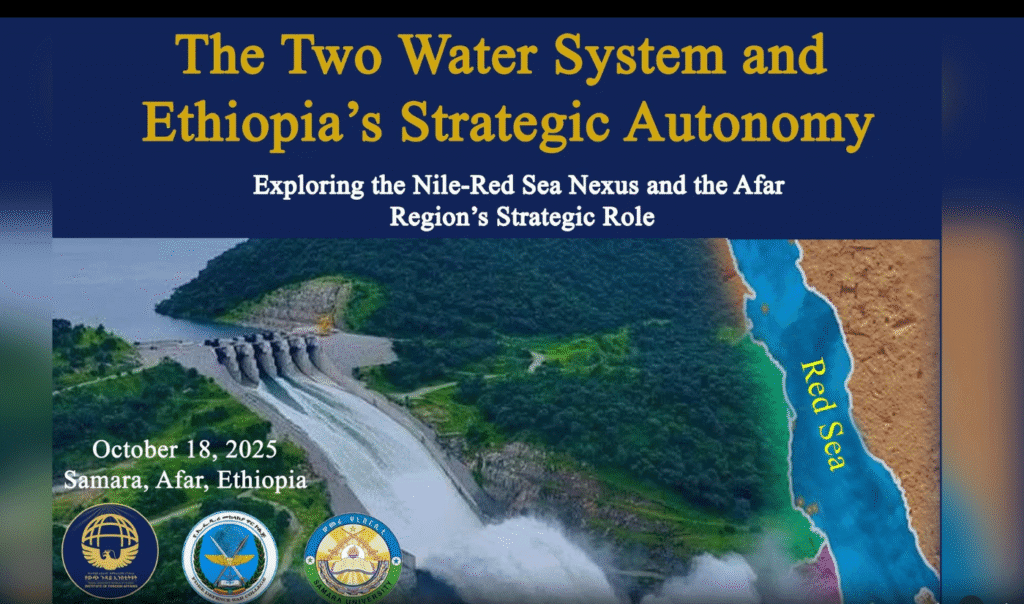Ethiopia’s Strategic Ties to the Red Sea and Nile Basin
Ethiopia’s future is indelibly linked to its access to vital water resources, primarily the Red Sea and the Nile Basin. This relationship was the focal point of a recent conference co-hosted by the Institute of Foreign Affairs (IFA), the Defense War College, and Samara University in Samara, under the theme “The Two Water Systems and Ethiopia’s Strategic Autonomy: Exploring the Nile – Red Sea Nexus and the Afar Region’s Strategic Role.”
The Importance of the Red Sea and Nile Basin
During the conference, Jafar Bediru, Executive Director of the IFA, emphasized the significance of Ethiopia’s geopolitical vision, stating, “as we approach the Red Sea, our power and vision expand.” This assertion showcases how critical these waterways are for Ethiopia’s strategic autonomy.
Historically, discussions regarding the Red Sea within a geopolitical context were often sidelined; Jafar noted that this pattern persisted for nearly three decades. However, he commended the current administration for fostering an environment in which these topics are now openly discussed, vital for the nation’s strategic independence.
Integral Role of the Red Sea and Nile
The primary objective of the conference was to underline the necessity of integrating the Red Sea and Nile into Ethiopia’s national agenda. Jafar pointed out that access to these waters represents more than mere economic opportunity—it encompasses identity, reconciliation, and a sense of historical continuity.
Mohamed Osman, President of Samara University, echoed this sentiment, articulating that Ethiopia’s quest for access to the Red Sea is deeply rooted in its historical ties and geographical realities. He emphasized that the forum plays a crucial role in fostering intellectual dialogue aimed at safeguarding Ethiopia’s national interests.
Connecting National Interests to Naval Strength
Commodore Tegegne Lata, Deputy Commander of the Ethiopian Navy for Combat Support Services, also asserted that Ethiopia’s national interests are intertwined with both the Nile and the Red Sea. He underscored ongoing efforts to reorganize the Ethiopian Navy, which had been disbanded for several years, with plans to build a modern, capability-driven force that is well-equipped and adequately staffed.
A Gathering of Key Stakeholders
The forum attracted senior government officials, including Fathi Mahdi, Deputy Chairperson of the House of Peoples’ Representatives’ Foreign Relations and Peace Affairs Standing Committee, along with members of the Ethiopian National Defense Forces and various invited guests. This assembly reflects the high-level importance that the Ethiopian government places on establishing robust ties to these critical water systems.
Understanding the Geopolitical Landscape
As Ethiopia navigates its path toward national autonomy and prosperity, it faces an array of geopolitical challenges and opportunities in the Red Sea and Nile Basin regions. The increasing openness in dialogue, spearheaded by forums such as these, proposes not only to enhance Ethiopia’s strategic autonomy but also to cement its position as a key player within the regional ecosystem.
For more insights on Ethiopia’s strategic interests and the significance of its waterways, read about geopolitical dynamics in East Africa.
By focusing on the transformative potential of the Red Sea and Nile Basin, Ethiopia aims to secure a future of stability and growth, ensuring that access to these lifelines is not just a matter of resource management, but a foundational component of national identity and resilience.
